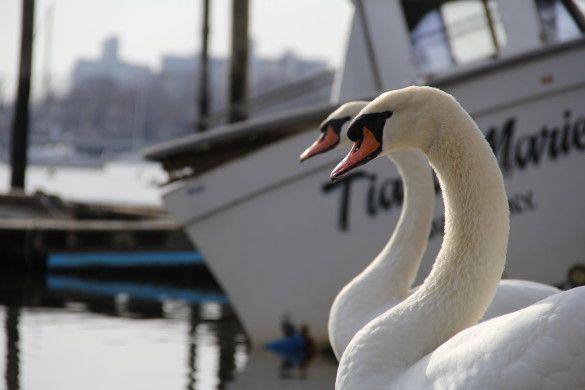Bill Protecting Sheepshead Bay’s Swans Moves Forward In Assembly

Legislation that would require more community input in the state’s plan to manage the population of mute swans across New York was given a stamp of approval by the state Assembly’s Environmental Conservation Committee, bringing it one step closer to becoming law.
The bill was introduced by Assemblyman Steven Cymbrowitz in February, following the release of a plan the month before by the state’s Department of Environmental Conservation to eradicate the species’ presence statewide, including the dozens of iconic swans that live in Sheepshead Bay. The plan called for capturing and killing 2,200 swans, as well as the destruction of their eggs and nests. It also proposed limiting their sale in the state, release in the wild, and a public education campaign urging residents not to feed the fowl, which they claim destroy habitat for native species. Mute swans are not native to the area, and are considered an invasive species.
The legislation, a similar version of which is being pushed by Queens State Senator Tony Avella in the Senate, would require that the state agency hold at least two public hearings and respond to concerns before finalizing any population management plans regarding mute swans. It also puts a two-year moratorium on allowing the agency to declare the mute swan a “prohibited invasive species,” a label that marks it for death.
Additionally, the agency would be required to not only prioritize non-lethal management techniques, and back up their arguments with scientific evidence. According to the sponsors, scientists remain conflicted about whether or not the mute swan population poses a significant threat to the habitat or people.
“Wildlife experts and environmentalists are not unanimous in their belief that exterminating the mute swan population is justified, and there’s plenty of debate over whether eradicating mute swans will be even minimally beneficial to the ecosystem or our environment,” Cymbrowitz said in a press release. “It is incumbent on the Department of Environmental Conservation to illustrate the necessity of eradicating this non-native species by demonstrating the actual damage to the environment or other species caused by mute swans,” he said. “It is also critical that the people of our community have a say in what happens to our feathered neighbors.”
In Sheepshead Bay, residents of Webers Court off Emmons Avenue told Sheepshead Bites they’ve lived alongside the birds for decades and can’t recall a single instance of an attack, as the DEC claims could happen.
“I don’t see them destroying anything,” said Cliff Bruckenstein, who has lived on Webers Court for 25 years. Bruckenstein went on to challenge the DEC’s claim that the mute swan can be bellicose. “They’re really not an aggressive species. They only get protective around their nests.”The bill may come for an Assembly vote soon, followed by the Senate.
However, the agency has already turned tail on the issue, announcing in late February that they would seek non-lethal methods of population management in regards to the swan. The reversal came after they received more than 1,500 comments from individuals and organizations, as well as 16,000 form letters and 30,000 petition signatures.
A new plan is being drawn up, and will be followed by a public comment period.




